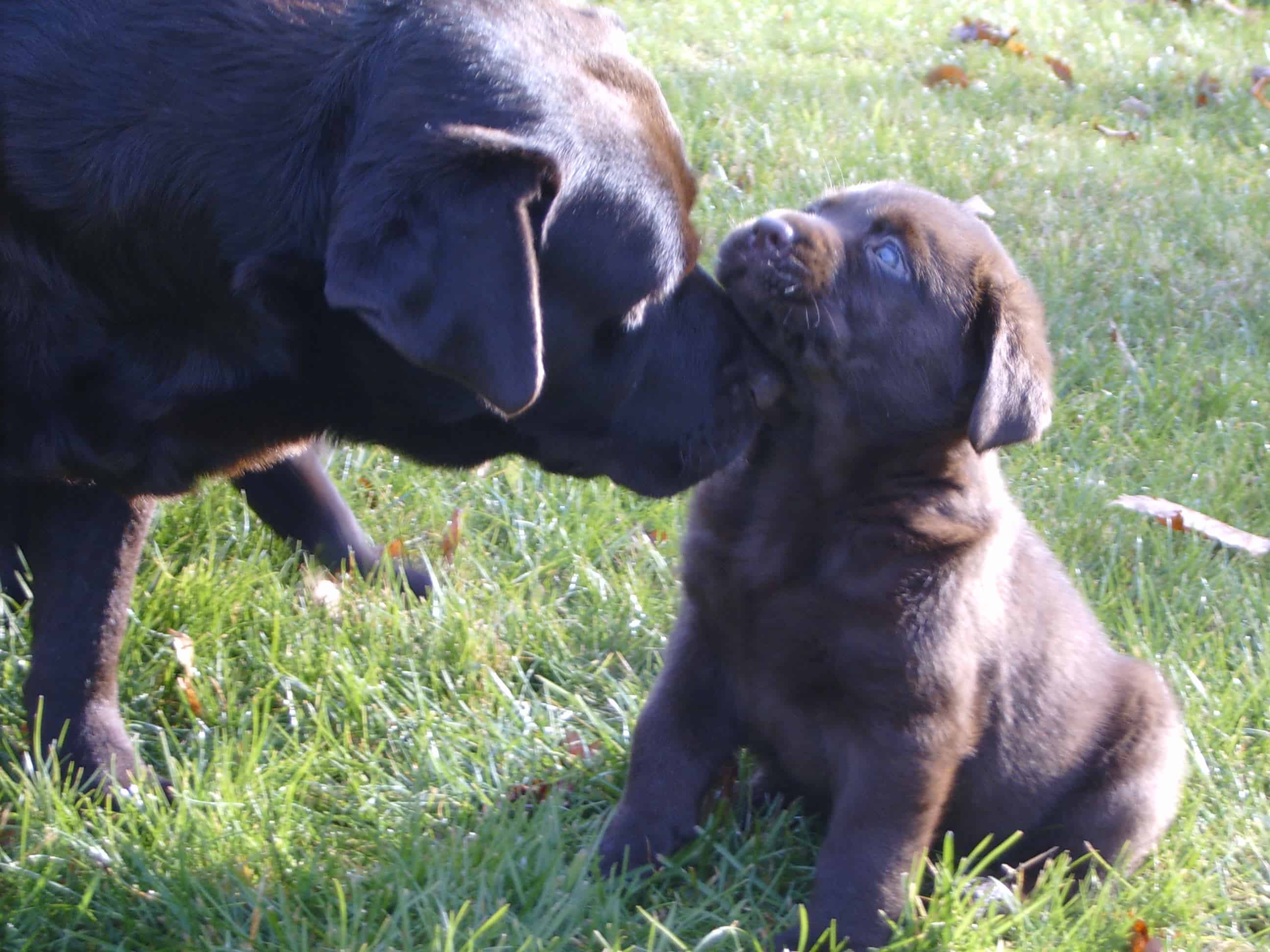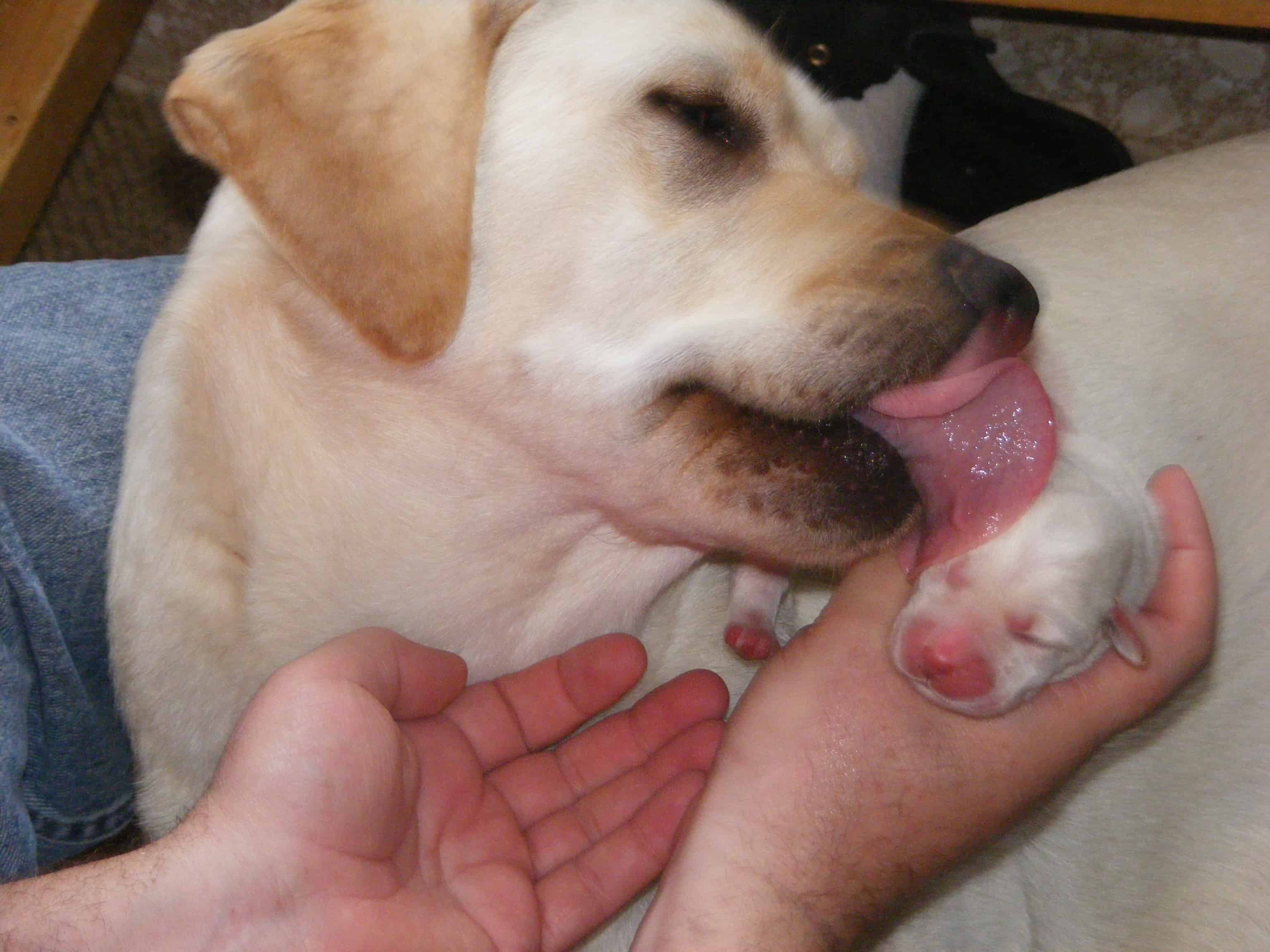How to Choose a Labrador
(Hint: it’s more about choosing a reputable breeder than a “puppy”!)
1. Find a breeder that breeds not just for “color”, but for genetic soundness, good temperament, and conformation to breed standard. If not, you may end up with an aggressive or hyper temperament, or a dog that succumbs to premature death. All pups are cute…but what kind of dog will you end up spending 15 years with???
Just because a dog has “papers” or is “AKC registered” does not make it a good dog. This merely means the dog’s parents are in the AKC registry (the AKC does not police QUALITY, they are only a registry!), …anybody can put two dogs together who have AKC registration, but they can be horrible specimens of a labrador! Hint: if all a newspaper ad can say is “shots, wormed…” that’s pretty pitiful if that’s all you can say about your pups!
2. Unless you are going to be doing high- stress, professional field trial competition, look for a lab with “English” bloodlines. American Field lines are a little different in temperament. The American field dogs can be hyper, high-strung, and do not always make the best indoor pets. Not ALL American labs are like this. But in “general” you may see this difference. If you are looking to do high stress field trial competition, a field lab may be what you want. But for a real laid back, “fireside” lab that sits at your feet, you may find the English labs a little more close to that description. The English labs are mild, sweet, quiet dogs which still maintain a playful attitude and have the natural retriever instinct, but these labs are sure to be good companion dogs that you can absolutely trust and enjoy in any circumstance. The English labs are also a little different in build than the field labs. (see our article on our “about labradors” page of this site)
3. Don’t buy the lab that is “closest in distance”, or “the cheapest in the newspaper”…this is the WORST criteria to determine the quality of Labrador you will have to live with for 12-15 years! Choose a breeder who has been breeding labs to improve the breed, who is selecting excellent breeding stock, and who is doing CERF and OFA clearances (hips/eyes). If you call a “breeder”, ask, “what was your purpose in breeding this litter?” If they say, “to get chocolates, or “to let our kids enjoy the experience”, or because they “love their dog” (commonly called “hobby breeders)”…these are poor excuses. If you ask if their dogs are OFA and CERF and they say “huh?????” HANG UP!!!! Or if they just say “yeah”, ask “what was the hip rating on the sire of dam of this litter?” Remember…even if you are just looking for a “pet” you don’t need to give up a good temperament and genetic soundness for the possibility of a poor temperament and a crippled or blind lab in the first year (literally!) Who wants to fall in love with a new family companion, just to have the heartbreak of death, serious illness, or premature euthanasia because of poor attention paid to the breeding of the dog? The extra $100-200 is worth it in the end…you’ll pile up hundreds or thousands of dollars in vet bills if you “skimp” on your initial investment of the “right dog”!
4. Ask if the pup comes with a health guarantee and what this includes. Most “hobby breeders” who have lower priced dogs will not do this, thus, the price is lower. Plus, they are not investing in testing for genetic clearances or investing in the most excellent of breeding stock. The breeder should be doing health clearances for hips and elbows (OFA), eyes (CERF, Optigen, AVCO), heart clearance, NARC clearance, and EIC (exercise induced collapse) clearance. If they say “what is that???” or “my vet says my dogs is fine” or “my pups never had problems” hang up…its just excuses, or they don’t want to know if their dogs carry these problems, or they are cutting corners ($$$) and not doing these clearances.
Chances are that if you see an ad in the newspaper, it is from a backyard breeder or puppy mill. Most serious breeders do not need to advertise their puppies in the newspaper – their reputation for well-bred puppies speaks for itself. Most of their puppies are sold by word-of-mouth, and they frequently have a waiting list for their puppies. The price of our puppies reflects the amount of time and resources we spend to produce well-bred puppies.
The Difference in Price?
So many of the people I talk to say “how come your puppies cost more than (Blank…)” what I want to know is, why do they cost ONLY blank??? read on…
Professional breeder– Both the sire and dam of this pup come from top quality breeding stock which was developed over years and years of selective and knowledgeable breeding. Both meet the requirement of the written AKC standard for the breed in conformation as well as temperament. Each has a pedigree, which has been studied and thoroughly researched. These dogs have been selected to breed to each other because they can both contribute to the excellence of the breed, plus complement one another.


Backyard Breeder– The dam of the litter was purchased from the local pet store, came from a puppy mill. She was sick off and on the first year of life due to many types of intestinal parasites and malnutrition. The sire, an over-sized male, lives down the street and was purchased from an ad in the paper. Neither owner has ever heard of the AKC or LRC written standard, neither owner has seen a written pedigree. The female is skittish and snappy, and her owners hope that having a litter will “calm her down”.
Professional Breeder– Before this breeding ever took place, both male and female had extensive genetic tests, including OFA, CERF, Optigen, NARC, and Heart Clearance. Only a good or excellent OFA rating was accepted. (no “poor” or “fair” please!) The health of her pups is guaranteed.
Backyard Breeder– the breeder is often unaware of genetic problems within the breed. Trips to the vet , except for dire emergencies or shots are considered “too expensive”. The breeders hope is to make money off the puppies and “get back what I paid for the mother dog”. Puppies are usually sold with no guarantee.
Professional Breeder– The breeder wishes to maintain a good reputation. His goal is to produce beautiful and sound specimens, which anyone would be proud to own. Profit, if any is made, goes toward future breedings, always aimed toward the betterment of the breed, or for show entries, handler’s fees, new equipment and important veterinary tests. Both the mother and pups are fed the highest quality diet. Many trips to the vet assure him that mother and pups are thriving under the very best care. The pups are raised in a busy part of the house where they are socialized, groomed and exposed to different kinds of stimuli. They are touched and talked to, cuddled and even sung to. They are never sold before they are seven weeks old. Every buyer must be screened.
Backyard Breeder– These puppies are born in a box, in the garage and receive little care other than what the mother gives. To cut costs they are weaned on generic dog food and allowed to nurse on the mother as long as possible to keep food bills down. The bitch’s health declines rapidly due to poor health and some pups are weak and runty. They are sold as quickly as possible because advertising and vaccines are expensive. They are usually not even sold until after they are 8 weeks old.
They are sold to anyone who has the cash. If the new owner is lucky he may receive a AKC or CKC registration application. Although the puppy is of very poor quality, it is always sold with full breeding rights. The new owner usually disappears with the pup, never to be seen again. If the market is not good, the breeder takes the leftover pups to the local pet shop.
The comparison you have just read is hypothetical, but very typical of what we see all too often. Although not every breeder who charges higher prices is reputable and ethical, pet buyers should keep looking until they find one that is. When I am asked why my prices are higher than those in some newspaper ads, I mail a copy of this article. Those buyers who respect the quality and excellence are wonderful customers and become “partners” in this hobby.
Those that are simply seeking companion pets deserve nothing less than a nice quality, healthy and trusting animal, as well as a breeder they can count on.”
Prospective puppy buyers may ask “Why are the pups so expensive?
“Why are those newspaper puppies so cheap?”
*****
The question should be: “Why are those pups in the newspaper so CHEAP???”
Remember. There’s wine and then there’s fine wine. That is how the Lab loving breeder views his dogs.
(Author Unknown. If you wrote the above article, please contact ******** Labradors to receive credit.)
I also wrote this up for people who tell me “I just want a pet and have no interest in showing or breeding, so I don’t care about the pedigree,” or something to that extent.
(the following Q & A is by Candyheart Labradors:)
Q: Why should I care about a dog’s pedigree if I just want a good family pet and don’t intend to show, hunt, or breed my dog?
A: A good pedigree isn’t everything, but it is a very good place to start when you want to learn something about a dog or it’s line. Even if all you want is a good family pet, you still want a healthy dog, a beautiful dog, and a smart, trainable dog right? And you probably also want to know that the pup was well bred and did not come from an uneducated breeder or a puppy mill right?
Well, a pedigree can tell you a lot about a dog. For example, an AKC certified pedigree will show you the health clearances, if any, of each dog in your pup’s family tree. You will be able to see if the parents, grandparents, and great grandparents were tested for their hips, elbows, eyes, etc. This is extremely important if you want a healthy dog.
You can also see if any of your dog’s parents, grandparents, or great grandparents earned any titles. Again, if you don’t want to show, hunt, or breed your dog you may wonder why this is important, however when there are a lot of champion show dogs in your dog’s pedigree you can see that your pup comes from a long line of beautiful dogs with correct conformation. It also means that you have a reasonable expectation of how tall and heavy your pup will grow to be since champions must meet the AKC’s breed standard in size and weight, so you can be assured that your pup will not grow to be twice the size it’s supposed to.
If your dog doesn’t have any titles in his or her pedigree, how do you know how he or she will turn out? Will she weigh 65 lbs or 105 lbs? Will she be pretty or smart? It may even have health problems steaming from the fact that it’s body is improperly proportioned or caring too much weight for its breed.
If you are looking for a dog with certain expectations in mind as to how the dog will look, how big it will get, if it will be healthy, and if it will be smart and trainable, carefully examining its pedigree is very, very important.
One last thing to consider is, a well bred, beautiful, smart, & trainable dog will come from breeders who spend the time and money to put titles on them and prove their dogs beauty, intelligence, and performance ability. If a dog has little to no titles in his or her pedigree and little to no health certifications, it either came from a puppy mill or an uneducated back yard breeder and will probably not meet many of your expectations regarding that breed. It’s also important to understand that a well bred, well rounded, healthy dog–even just as a pet–will cost a lot of money. Only expect to pay less than $800 or so for a poorly bred dog If you don’t believe in spending much on a dog that is “just a pet” or you simply don’t feel you can afford it, that’s your decision, just don’t expect the same quality. I believe you get what you pay for.

…Me and Mallory (Mackie’s sister)
It is our duty to breed responsibly, and this means…
- using high quality breeding stock that have been temperament tested, are loving, and beautiful specimens, certified free of dysplasia and other common genetic abnormalities.
- placing puppies with families that have been approved only after being interviewed at length, and have demonstrated a willingness and ability to raise a member of this noble breed in a healthy, nurturing environment.
- *offering complete follow-up and lifelong support for all puppies produced
- assisting families that are interested in pursuing events especially designed for retrievers by recommendations for training and classes, clubs and associations as well as guidance to get started.
Helpful Steps to take when reviewing breeding programs in search of a new companion …
As in any profession, there are those in purebred dog breeding that act with integrity and those that simply conduct themselves in a manner unbecoming.
- Be extremely wary of the information you obtain. Much of what you read is opinion, and often not informed opinion. Some is even blatantly incorrect. In the highly competitive landscape that is purebred dog breeding/showing/trialing etc. do your homework for best results.
- The best breeders are well thought of in a circle of their peers and are exhibitors in their breed and members in good standing in one or more dog clubs. Get in contact with the club most reputable breeders belong to in their area and ask for a professional referral.
- Research a variety of breeds to find the one that best suits your family and lifestyle.
- Talk to people you know or meet that own the sort of dog you admire. Find out where they acquired him or her, and how happy they are with their pet and breeder.
- Visit websites, club affiliations, attend shows and trials, see the dogs, read and hear testimonials and get info from a variety of sources before committing. Judge for yourself to avoid disappointment.
Good Luck!
